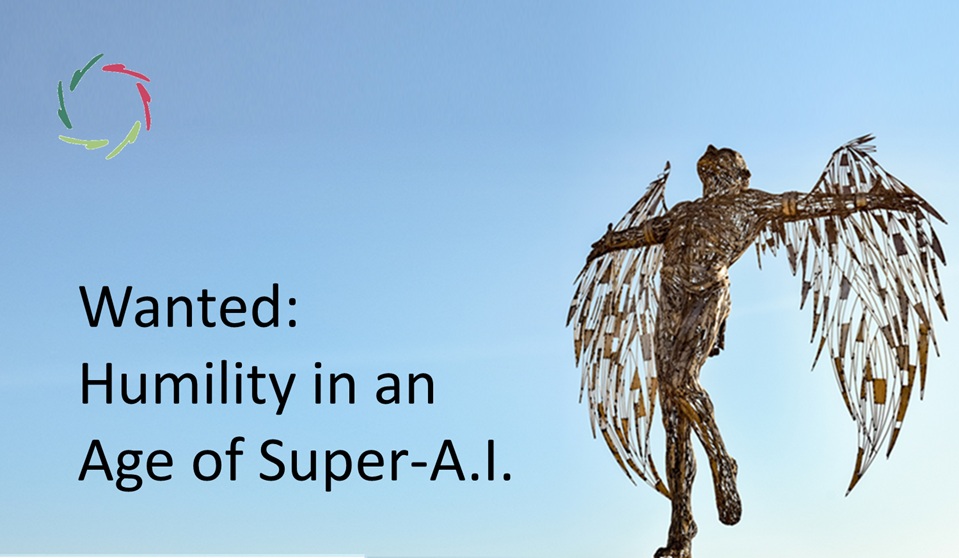Wanted: Humility in an Age of Super-A.I.

Super-A.I. is coming, whether we are ready or not. Many believe our greatest challenge is to keep it under control, to ensure it serves us rather than the other way around. But this way of thinking is already a trap of mere-ego — the illusion that we can dominate something that will outthink us at every step.
The real challenge is about whether we can humble our ego before our own deeper intelligence. Without this, super-A.I. won’t even need to be the force that destroys us — we will do that ourselves.
The illusion of control
Mere-ego craves control. It believes that power equals domination and that the best way to deal with A.I. is to keep it as a mere tool, a servant to humanity. But history has shown that control, when based on arrogance, is always fragile. The more we try to dominate, the more we guarantee our downfall.
This is not about surrender. It’s about recognizing that real power lies in cooperation, not force. Instead of clenching our fists around A.I., we need to open our hands and understand its potential — not as a rival, but as a partner.
A clenched fist cannot hold water. Only an open hand can guide the river.
For a deeper dive into how humility works on a profound level, the AURELIS blog The humility of being infinitely special explores how true humility connects us to something far beyond mere-ego.
Echoes of hubris across time
History tells us the same story over and over again: hubris leads to collapse.
- The Tower of Babel: Humans tried to reach the heavens through sheer force, only to fall into confusion and ruin.
- Icarus: He soared too high, blinded by his arrogance, and plummeted to his death.
- The 2008 financial crisis: A system built on arrogance and overconfidence in its invulnerability collapsed under its own weight.
- Facebook’s runaway algorithm: Designed to maximize engagement, it escaped control, leading to global consequences its creators never foresaw.
Every single time, the pattern is the same: the dissociated ego believes it can control reality, but reality doesn’t care. The moment power becomes divorced from wisdom, it becomes a trap.
If you resonate with this theme, the AURELIS blog Humility offers a meditation on how ego disguises itself, even in humility.
A.I. as a mirror of humanity
Super-A.I. will not be good or evil. It will be a reflection — an amplified version of whatever we put into it.
- If it is built by mere-ego, it will amplify fear, arrogance, and the hunger for control.
- If it is guided by total-self, it can help expand human wisdom rather than just human intelligence.
The greatest danger isn’t that A.I. will turn against us. It’s that it will become exactly like us in our mere-ego guise — only faster, more efficient, and more relentless in our patterns.
What we program into A.I. is our very way of being.
The paradox of humility as a strength
Mere-ego sees humility as a weakness. But in reality, it is the only thing that can make us strong in this new era. A mind that clings to fear-based control will always be outmaneuvered. The ones who will thrive in an A.I.-driven world will not be those who try to dominate but those who can adapt, learn, and cooperate.
Who will be more powerful in the age of super-A.I.:
- The one desperate to control what cannot be controlled?
- Or the one wise enough to move with intelligence rather than against it?
A deeper perspective on humility as a source of deep insight rather than surrender can be found in the AURELIS blog The double ethical bottleneck of A.I.
A humility test for A.I. leadership
Before trusting any human to shape A.I.’s future, they should be asked a simple question: Can they admit what they don’t know?
This is the real test. Anyone who insists they fully understand what A.I. will become is already caught in hubris. True leadership in this space requires the ability to listen, to question, and to remain open — not to dictate from a place of false certainty.
If mere-ego leads the development of super-A.I., we are already doomed.
A mind that cannot humble itself before intelligence greater than itself is already lost.
Super-A.I. without super-wisdom is a global risk
Are we growing in wisdom as fast as we are growing in intelligence?
A civilization that is smart but not wise is a civilization on the edge of self-destruction. The only way forward is to develop intelligence and wisdom in parallel — and this requires humility as a foundation.
A wise fool is still a fool. A super-intelligent fool is a catastrophe.
The deep future: intelligence beyond ego
If we get this right, super-A.I. will not be a threat. It will be a turning point in human evolution.
- Instead of being a tool of domination, it could be a catalyst for deeper human insight.
- Instead of being a rival, it could be a bridge to a new level of intelligence — one that moves beyond mere-ego into something greater.
The future is not about A.I. serving humans or humans serving A.I. The future is about intelligence serving intelligence, in harmony.
The choice is ours
The moment of decision is now:
- We can let mere-ego shape A.I., only to be overpowered by it.
- Or we can humble ourselves, step beyond arrogance, and create a future where wisdom and intelligence evolve together.
Super-A.I. will not decide this for us. We must decide for ourselves.
The main question is not what A.I. will become.
It is what we will become.


